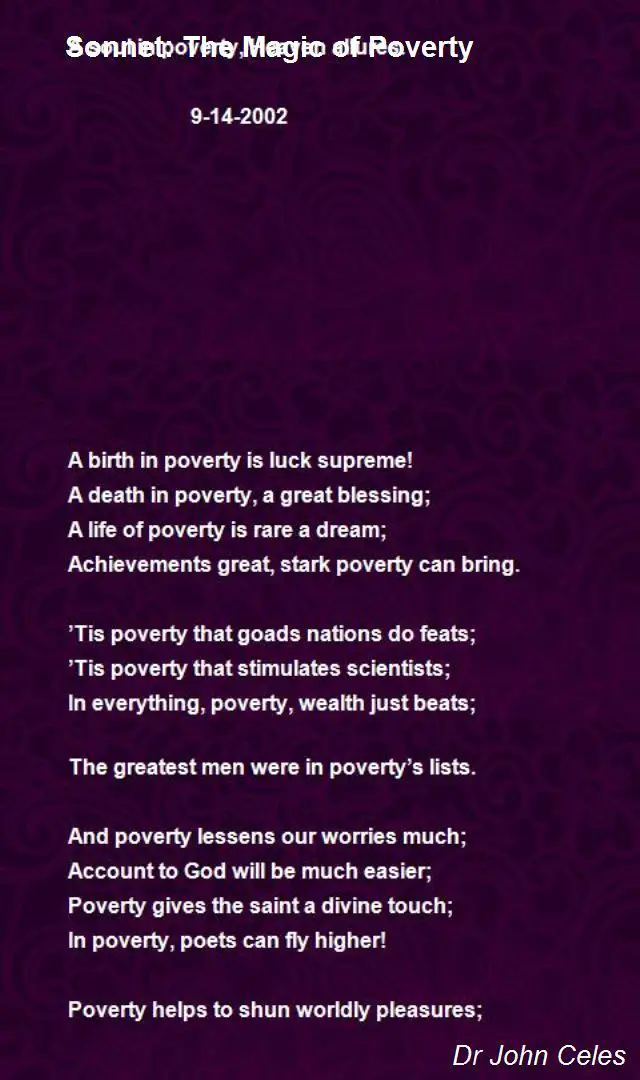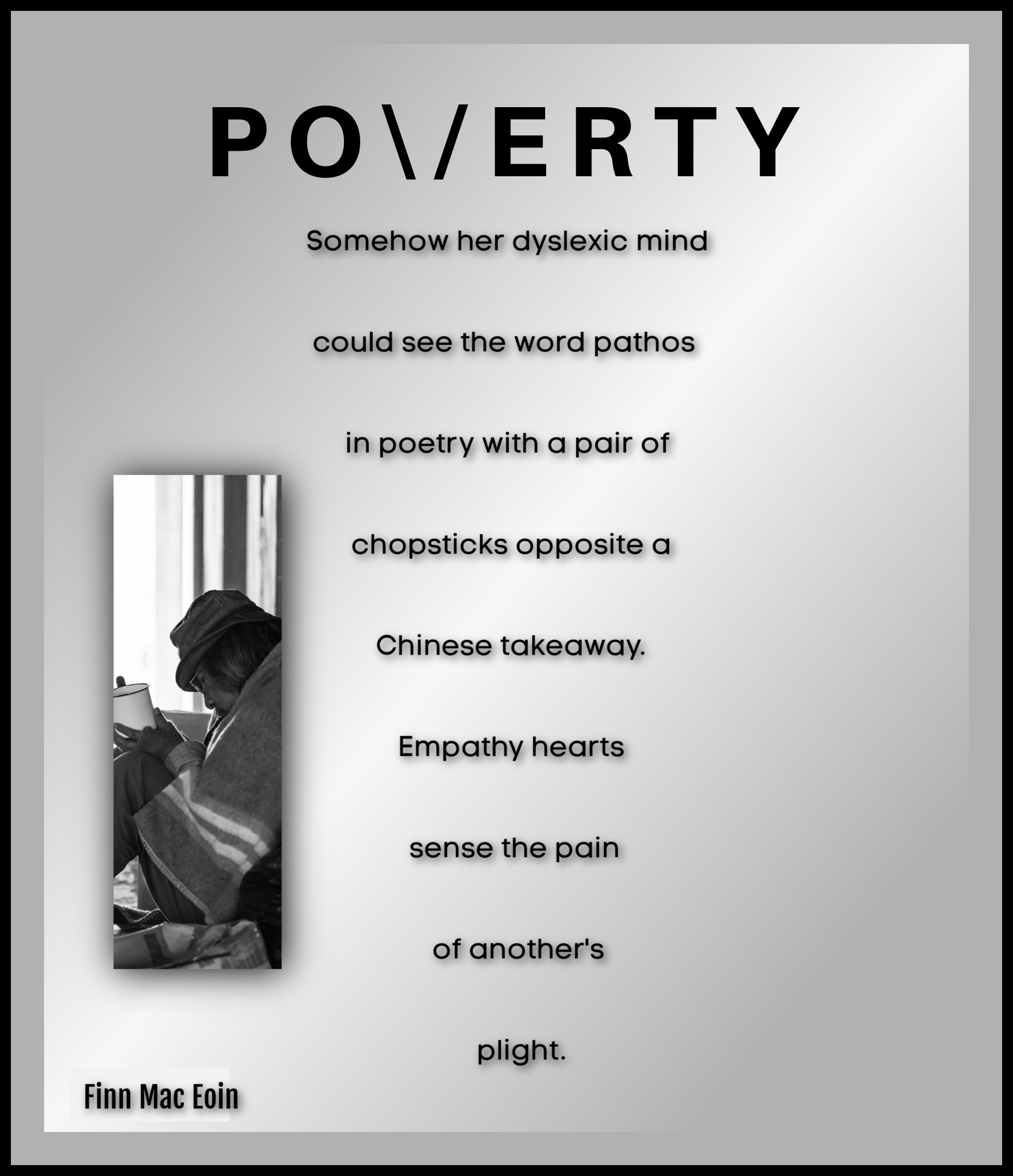Imagine a world where basic necessities are a constant struggle, where hunger pangs gnaw at your stomach, and your heart aches with the weight of dreams deferred. This is the reality depicted in the poem “From the Complaints of Poverty,” a powerful testament to the plight of those living in poverty. It’s a poem that has resonated with readers for centuries, its raw honesty and raw emotions cutting through the veil of societal indifference to illuminate the harsh realities faced by those struggling to survive.

Image: www.poemsearcher.com
“From the Complaints of Poverty,” penned by an anonymous author during the 17th century, offers a poignant portrayal of the struggles that accompany a life devoid of financial security. It speaks to the relentless cycle of poverty, the constant anxieties, the lack of opportunity, and the yearning for a life beyond hardship. As we delve deeper into the poem’s verses, we will be led on a journey that reveals the human cost of poverty, its impact on individuals, and the urgent need for societal change.
A Glimpse into the Depths of Poverty
The poem opens with a powerful description of the narrator’s desperate search for a means to survive. “I am poor,” they lament, “I am despised, and I am alone.” These simple but profound words strike at the very core of the human experience, capturing the feelings of isolation and despair that accompany poverty. It’s a stark reminder that poverty isn’t just a lack of money, it’s a state of being, a feeling of being unseen, unheard, and undervalued.
As the poem progresses, we are introduced to the countless indignities and challenges that poverty brings. The narrator speaks of hunger pangs that “gnaw at my belly” and the shame of having to beg for sustenance. The inability to provide for basic needs, the lack of access to healthcare and education, the constant fear of eviction and homelessness – these are just some of the hardships that the poem vividly portrays.
A Call for Empathy and Action
Beyond the emotional impact, the poem also serves as a call to action. It compels us to consider the systemic injustices that perpetuate poverty and to recognize our own role in creating a more equitable society. “From the Complaints of Poverty” reminds us that poverty is not an individual failing but a complex societal issue that requires collective action.
The poem’s enduring relevance lies in its ability to transcend time and social barriers. While written centuries ago, its themes remain incredibly relevant today. Poverty, in all its forms, continues to plague societies across the globe, impacting millions of individuals and families. Despite advancements in technology and the accumulation of wealth, the fundamental causes of poverty – inequality, discrimination, and lack of opportunity – remain largely unchanged.
The Power of Storytelling in Fostering Empathy
“From the Complaints of Poverty” is a poignant example of how the power of storytelling can be used to foster empathy and understanding. By sharing the intimate struggles of someone experiencing poverty, the poem compels readers to step outside of their own perspectives and see the world through the eyes of another. It humanizes the experience of poverty, reminding us that those living in poverty are not statistics but individuals with hopes, dreams, and aspirations just like everyone else.

Image: sitedoct.org
The Importance of Addressing the Root Causes
The poem also highlights the importance of addressing the root causes of poverty, rather than simply offering temporary solutions. Poverty is not simply a lack of money; it is a complex web of social, economic, and political factors that perpetuate hardship and inequality. To truly address poverty, we must challenge the systems that create and sustain it. This means tackling issues such as lack of access to education and healthcare, discriminatory practices, and systemic inequalities in wealth distribution.
Engaging With the Poem’s Legacy
“From the Complaints of Poverty” has inspired countless artists, activists, and social reformers throughout history. It has served as a powerful tool for raising awareness about poverty and sparking social change. The poem’s legacy continues to resonate today, reminding us of our shared humanity, the importance of compassion, and the need to work collaboratively to create a world where everyone has the opportunity to thrive.
Insights and Actions We Can Take
The poem encourages us to look beyond the statistics and see the human faces behind the poverty crisis. It urges us to be more compassionate, to challenge systemic inequalities, and to work towards a more just and equitable world. Here are some actionable ways we can contribute to the fight against poverty:
- Donate to organizations working to alleviate poverty: By supporting organizations dedicated to providing essential services, promoting education and job training, and advocating for policy changes, we can make a tangible impact on the lives of those struggling to survive.
- Volunteer your time and skills: Sharing your time and expertise with local charities and community organizations can make a significant difference in the lives of those in need.
- Become an advocate for social justice: Use your voice to speak out against poverty and advocate for policies that promote economic equality and social inclusion.
From The Complaints Of Poverty Poem
Conclusion
“From the Complaints of Poverty” is more than just a poem; it’s a powerful testament to the lived experience of poverty and a call to action for us all. It reminds us of the importance of empathy, the urgency of addressing the root causes of poverty, and our collective responsibility to create a more just and equitable world. As we engage with this poem’s timeless message, let us remember that poverty is a shared problem that requires shared solutions. By working together, we can create a future where everyone has the opportunity to live a life free from deprivation and despair.






